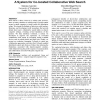99
Voted
CHI
2007
ACM
16 years 2 months ago
2007
ACM
Web search services are among the most heavily used applications on the World Wide Web. Perhaps because search is used in such a huge variety of tasks and contexts, the user inter...
108
click to vote
CHI
2007
ACM
16 years 2 months ago
2007
ACM
Web search engines present search results in a rank ordered list. This works when what a user wants is near the top, but sometimes the information that the user really wants is lo...
CHI
2008
ACM
16 years 2 months ago
2008
ACM
Todays Web browsers provide limited support for rich information-seeking and information-sharing scenarios. A survey we conducted of 204 knowledge workers at a large technology co...
113
click to vote
CHI
2008
ACM
16 years 2 months ago
2008
ACM
Web search is often viewed as a solitary task; however, there are many situations in which groups of people gather around a single computer to jointly search for information onlin...
117
Voted
CHI
2008
ACM
16 years 2 months ago
2008
ACM
Current user interfaces for Web search, including browsers and search engine sites, typically treat search as a transient activity. However, people often conduct complex, multique...
113
Voted
KDD
2006
ACM
16 years 2 months ago
2006
ACM
The top web search result is crucial for user satisfaction with the web search experience. We argue that the importance of the relevance at the top position necessitates special h...
96
Voted
CHI
2009
ACM
16 years 2 months ago
2009
ACM
Web search and browsing have been streamlined for a comfortable experience when the network connection is fast. Existing tools, however, are not optimized for scenarios where conn...
WWW
2004
ACM
16 years 2 months ago
2004
ACM
Previous work on understanding user web search behavior has focused on how people search and what they are searching for, but not why they are searching. In this paper, we describ...
95
Voted
WWW
2005
ACM
16 years 2 months ago
2005
ACM
There have been recent interests in studying the "goal" behind a user's Web query, so that this goal can be used to improve the quality of a search engine's re...
93
Voted
WWW
2007
ACM
16 years 2 months ago
2007
ACM
We conducted a series of experiments in which surveyed web search users answered questions about the quality of search results on the basis of the result summaries. Summaries show...

